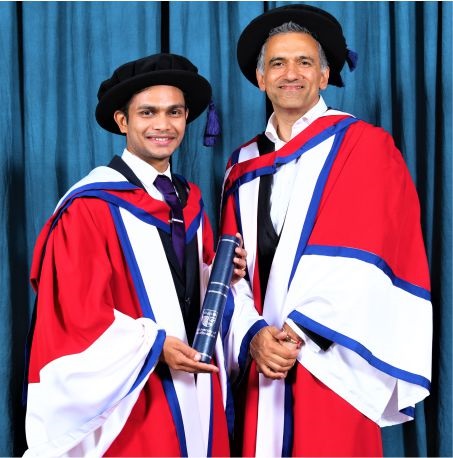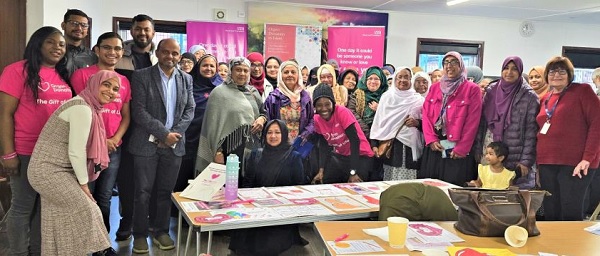Home / Newsletters / ITN 73 / Subscribe
Research-Based Lessons: Barriers and Solutions to Deceased Donation
Britzer Paul V
Indian Transplant Newsletter. 2024 Jul-Sep; 23(3):p14
Print ISSN 0972 - 1568
Online ISSN 3048 - 653X
PDF
Dr. Britzer Paul’s PhD research was on identifying the barriers and facilitators influencing deceased organ donation in India, focussing on both the public and the key stakeholders. This PhD research was conducted in collaboration between the University of Bedfordshire, United Kingdom, and the MOHAN Foundation, India, supported by a full scholarship under the Global Challenges Research Fund (GCRF).
Methods: The research comprised a systematic review and two qualitative studies. The integrative systematic review (Study 1) revealed that decisions regarding organ donation are shaped by multiple societal layers, influenced by an individual's socialisation process. Consequently, Studies 2 and 3 were guided by the socio-ecological model and social constructivist philosophy, employing a qualitative approach. These studies were conducted in Chennai, Chandigarh, and Delhi (India). Study 2 involved 25 focus group discussions with the general public, while Study 3 comprised 14 in-depth interviews with transplant coordinators involved in facilitating deceased organ donations in these regions. Data from both the studies were analysed using framework analysis, which facilitated comparison of cases to identify similarities and differences. This approach was particularly useful for comparing public attitudes and stakeholder experiences in regions with differing levels of deceased organ donation performance.
Findings: The three studies collectively highlighted that while individuals may express a willingness to become organ donors, their decision-making is often influenced by external societal factors, including family, religion, community, and trust in the healthcare system. In many cases, an individual's intention to donate is overridden by the larger social context, particularly when the final decision rests with family members, as is the case in India's opt-in policy. Even though individuals may discuss various aspects of life openly with their families, they tend to avoid sensitive topics such as death and deceased organ donation, fearing resistance or disapproval. While religion was identified as a barrier in the systematic review, the qualitative research suggested that uncertainty surrounding religious perspectives rather than explicit religious opposition contributed to hesitation in registering or consenting to organ donation. Additionally, the negative portrayal of deceased organ donation in social media and community conversations fostered mistrust in the healthcare system, further discouraging individuals from donating. There was also a perceived inequity in access to transplants, leading people to question why they should donate organs when they themselves might not receive one in need. Although these barriers were prevalent across all study sites, significant differences emerged in the healthcare system's practices and infrastructure.
The interviews with transplant coordinators revealed that the availability of infrastructural support had a substantial impact on consent rates. Factors such as accountability, organisational support (from government bodies, the police, and hospitals), and institutional policies and practices were crucial. Centres with robust infrastructure, policies, and practices achieved higher rates of deceased organ donation compared to those lacking these supports. This underscores the need to focus not only on public awareness and engagement but also on hospital practices to improve organ donation outcomes. Learning from high-performing centres and implementing consistent policies and practices across all regions are essential steps toward enhancing deceased organ donation rates and achieving self-sufficiency in India.
Countries like Spain have demonstrated the importance of strengthening hospital networks and infrastructure, while others have emphasised community engagement. In the context of India, a dual approach, incorporating both strategies, could prove effective. Addressing the barriers and facilitators identified in the current study in improving hospital-level practices and standardising deceased organ donation procedures across regions along with community engagement in normalising conversations about deceased organ donation would foster a more supportive environment for deceased organ donation in India. This PhD research, therefore, advocates for a whole-systems approach to improving deceased organ donation in India.
References:
1. Vincent BP, Randhawa G, Cook E. Barriers towards organ donor registration and
consent among people of Indian origin living globally: a systematic review and
integrative synthesis—protocol. BMJ open. 2020 Jun 1;10(6):e035360.
2. Vincent BP, Randhawa G, Cook E. Barriers towards deceased organ donation among
Indians living globally: an integrative systematic review using narrative synthesis. BMJ
open. 2022 May 1;12(5):e056094.
3. Vincent BP. Global experiences in gaining cooperation towards organ donation: a
reply to 'Nurturing, nudging and navigating the increasingly precarious nature of
cooperation in public health: the cases of vaccination and organ donation'by Heidi J.
Larson and Alexander H. Toledo. Global Discourse. 2023 Sep 18;1(aop):1-6.
4. Vincent BP. Barriers and facilitators toward deceased organ donation among general
public and stakeholders in India. Available at:
https://uobrep.openrepository.com/handle/10547/625965
5. Vincent BP, Sood V, Thanigachalam S, Cook E, Randhawa G. Barriers and Facilitators
Towards Deceased Organ Donation: A Qualitative Study Among Three Major
Religious Groups in Chandigarh, and Chennai, India. J Relig Health. 2024 Oct 6.
doi: 10.1007/s10943-024-02148-8. Epub ahead of print. PMID: 39369372.



Available at:
https://www.itnnews.co.in/indian-transplant-newsletter/issue73/Research-Based-Lessons-Barriers-and-Solutions-to-Deceased-Donation-1347.htm
- Copyright © 2025. Published by MOHAN Foundation
